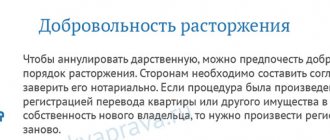Termination of deed of gift by mutual agreement
The simplest procedure for terminating an agreement on the gratuitous transfer of a gift into ownership is provided upon reaching mutual agreement of the parties.
If the agreement is concluded orally, then the donee simply returns the gift. But what if the deal is written? In this case, the donor and donee enter into an additional written agreement to terminate the contract.
For gifts subject to mandatory state registration, such an agreement will be the basis for a reverse transfer of ownership (for example, if we are talking about real estate).
Grounds for cancellation of deed of gift
ConsultantPlus has many ready-made solutions and analytical articles, including the article “Deed of Gift: When can the court cancel it?” If you don't have access to the system yet, sign up for a free trial online. You can also get the current K+ price list.
There are other grounds on which a gift agreement may be annulled. A deed of gift is understood as a gratuitous transfer of something for use; accordingly, if the agreement contains signs of a compensated transaction, such an agreement will be invalid.
In judicial practice, there are cases when a gift is recognized as a sham transaction. Most often, a purchase and sale is disguised as a deed of gift. Citizens enter into a transaction for various reasons, for example, to avoid taxation or division of property. Let's say a married citizen decides to purchase real estate. To avoid the possible division of common property with the spouse, the acquisition of real estate was formalized as a deed of gift, and the donor was paid the full cost of such a “gift.” Cancellation of a gift agreement in such situations is possible in court.
If the donee killed the donor or caused harm to his health
Based on paragraph 1 of Art. 578 of the Civil Code of the Russian Federation, the donor has the right to cancel his decision on the gratuitous transfer of value if the recipient has committed any actions in relation to him or close members of his family that pose a threat to health or life. A significant condition for cancellation is the conscious criminal intent of such actions.
Important! It is impossible to cancel a deed of gift on the specified basis if the harm was caused to the donor through negligence or unknowingly, for example, if the act was committed by an incapacitated person.
If the donor survives the donee
Cancellation of a deed of gift is allowed in the event of the death of the recipient of the gift, provided that such a clause was originally stated in the document confirming the intention to transfer the item free of charge. In the absence of such a clause in the contract, there are no grounds for termination due to the death of the recipient. The heirs of the donee can become the owners of the gifted value.
If the donor goes bankrupt
Cancellation of a gift transaction is also possible if an agreement on the gratuitous transfer of valuables was concluded six months before the individual entrepreneur or legal entity declared its insolvency. We are talking about individual entrepreneurs and organizations acting as the donor. A deed of gift concluded in this way will be subject to cancellation if interested parties go to court. Such persons may be creditors of the organization that has declared its insolvency. After the cancellation of the gift agreement, the property assets will be added to the bankruptcy estate of an individual entrepreneur or organization at the stage of liquidation.
In 2020, individuals also had the opportunity to file for bankruptcy in order to get rid of exorbitant debt obligations.
Important! An agreement on donation of property concluded during the year preceding the start of bankruptcy proceedings for an individual will be declared invalid.
If the recipient treats the gift poorly
The law gives the donor the right to protest the transaction in court in the case where, after the transfer of the gift, there is a threat of its loss due to mistreatment and the transferred item has a significant intangible value for the original owner. This condition is enshrined in paragraph 2 of Art. 578 of the Civil Code of the Russian Federation, however, according to law enforcement practice, this provision is used to cancel a deed of gift quite rarely. This is due to the fact that it is difficult to prove the intangible value of the transferred item. For example, a citizen transferred ownership of an apartment to his relative free of charge. A relative who received real estate as a gift started renovations and redevelopment. The donor, having learned about the work being carried out, wished to terminate the donation transaction. Most likely, it will not be possible to cancel the deal in court, since the law does not prohibit carrying out repair work in your own home.
Actions required to revoke a contract
At the beginning of consideration of this issue, we will determine the circle of persons who can initiate this issue. This is not only a benefactor. Such persons may also be the recipient of the gift and government agencies.
You can find out more about how a deed of gift is contested during the life of the donor here, and how the procedure takes place through the court and by agreement of the parties, read here.
At the initiative of a benefactor
This subject, in fact, has two paths.
- The first way is to cancel the deed of gift on the grounds listed in the first section of this article.
For example, if an ungrateful recipient of a gift breaks walls in an apartment or lights a fire to cook barbecue, the benefactor has the right to be upset about this, put his passport in his pocket and pay a visit to the notary. Cancellation of a deed of gift is the same simple notarial operation as its issuance. The notary must verify the identity of the benefactor, obtain documents indicating that the deed of gift was made by him, prepare papers on the cancellation of the deed of gift and certify the signature of the former benefactor on them. After that, it's a done deal. There is no longer any deed of gift. - The second way is more difficult. This is the implementation of the grounds for invalidating the contract. These grounds are listed in the second section of the article, with the caveat that they are usually applied by the benefactor’s relatives and friends after his death.
But if the benefactor is alive and such circumstances occurred, then he is in no way deprived of the right to realize them. If a person forcibly became a benefactor and signed a deed of gift with a knife to his throat. Doesn’t he have the right to protest it later, having recovered from the shock? Yes he has every right!
However, in this case it will not be possible to get rid of it simply by going to a notary.
This is the subject of legal proceedings and it is necessary to prepare a claim to invalidate the gift agreement. The court will be required to consider such a claim and make a decision within two months. A party dissatisfied with a court decision may, within the established time frame, appeal it through the appellate and cassation procedures.
The result of implementing both paths is the same. Both on the basis of the notarial cancellation of the deed of gift, and on the basis of a court decision that has entered into force, the former benefactor receives the gift back at his disposal.
Read about the cases in which a benefactor can challenge a deed of gift and sue the property here.
At the initiative of the donee
The law states that the recipient of a gift, if he is not particularly happy about it, can refuse the gift. It is best if he understands this before the notarial issuance of the deed of gift and declares this to the notary in the form of a written refusal. But if the owner of the gift has developed his opinion at the wrong time and the transaction has already been completed, he needs to contact the BTI.
We discussed in detail in this article whether the recipient can voluntarily give up the apartment.
At the initiative of government agencies
The state body has the right to initiate cancellation of the deed of gift if it establishes:
- violation of state rights (for example, budget revenues were not received as a result of incorrect execution of a transaction and the Federal Tax Service of the Russian Federation is involved in the process);
- violation of the rights of citizens (for example, a deed of gift was issued under the threat of murder, and law enforcement agencies are involved in the process).
Essentially, this is the same way to file a claim to invalidate a deed of gift, if there are grounds listed in section 2 of the article, and if the law grants a specific government body the authority to file such claims in court.
These may also be cases of actual absence of a contract, errors in it, or incorrect execution.
Additionally, it is interesting to highlight such grounds for declaring a transaction invalid as the commission of a so-called sham transaction.
When, by registering the gift side of the transaction, the purchase and sale agreement is masked, as if hiding the latter from the regulatory authorities, in order to reduce the tax burden on this transaction.
Is it possible to cancel a gift deed after the death of the donor?
There are often situations when it is necessary to cancel an already completed gift transaction after the death of the donor. Such precedents most often arise when heirs learn that the intended inheritance was gifted to third parties. The difficulty with these lawsuits is that it is impossible to know whether the transaction was truly the will of the deceased. However, under certain circumstances, it is still possible to revoke a deed of gift.
For example, if the donor had limited legal capacity, suffered from a mental disorder during his lifetime and did not realize the consequences of his actions. If there is evidence, interested parties have the right to apply to the court with a claim to annul the contract. Please note that this is no longer a cancellation of the donation, but a contestation of the gift agreement.
Important! Do not confuse the cancellation of a gift and challenging a gift agreement - these are different things. The grounds for canceling a donation are provided for in Art. 578 of the Civil Code of the Russian Federation, we listed them above. Challenging the contract is possible on other grounds provided for by the Civil Code of the Russian Federation. For example, in the case when a donation is an imaginary or feigned transaction, when it is concluded with a person who does not have legal capacity, etc.
Grounds for withdrawal in a claim
There are two possible options here.
- The first of them is the groundlessness of the claim. It may manifest itself in a violation of the above logical connection between the elements of the claim: grounds - factual circumstances that confirm them - evidence confirming these circumstances.
The grounds and the circumstances confirming them may not correspond to each other, but in fact do not confirm anything. And they are confirmed by other grounds to which the benefactor does not refer. Or these elements of the claim may be in reliable connection, but the evidence base is lame.In this case, you need to carefully study the negative court decision and file a claim again.
- The second option is a justified claim that is not accepted by the court. That is, there is a logical connection and the evidence is in order, but the court did not understand the benefactor. In this case, it is necessary with all determination to appeal the negative court decision to higher authorities and achieve its cancellation.
In conclusion, first of all, I would like to urge the reader to be attentive, so as not to fall into a situation where there is a deed of gift, but tomorrow you need to take care of the issue so that it no longer exists.
But if this has already happened, then start preparing for the trial from the end, namely by collecting evidence confirming the validity of the claim.
Didn't find the answer to your question? Find out,
When a deed of gift cannot be contested
Current legislation provides for certain periods during which a person can go to court to protect his rights and legitimate interests. This time interval is called the statute of limitations. In some cases, it is possible to restore the missed statute of limitations, provided that there are compelling valid reasons due to which the citizen was not able to go to court in a timely manner.
As for gift agreements, the legislation establishes the following periods during which cancellation of the transaction is permissible:
- In order to recognize the invalidity of a contract (void transaction), you can go to court within three years. If the plaintiff is one of the parties to the transaction, then the 3-year period is calculated from the moment the deed of gift is executed. In other cases, when the rights of third parties are infringed, the 3-year period begins from the moment when these persons became aware of the fact of execution of the transaction.
- To challenge a deed of gift for reasons other than a void transaction, the limitation period is one year.
After the deadlines provided by law have expired, you can go to court. But if the defendant claims that the statute of limitations has expired, this will be an independent basis for refusing to satisfy the claim.
Instructions for performing the procedure
Cases of going to a notary to cancel a deed of gift, as well as the parties concluding an appropriate agreement to cancel the transaction are understandable.
Let's consider the most difficult judicial option for canceling a deed of gift.
Where to go? Jurisdiction
You need to go to court. But the question arises, which one exactly. The general rule regarding the location of the second party does not apply here. You must go to court at the location of the apartment.
Time limits for going to court
No specific features have been identified for this category of disputes. A general statute of limitations of three years applies.
What documents will be needed
To go to court, a statement of claim is drawn up to declare the deed of gift invalid.
This document must refer to the grounds on which the law connects the invalidity of transactions, some of which are listed in section two of the article.
The existence of these grounds must be confirmed by relevant factual circumstances, which must be described in the application.
- statement of claim for cancellation of the gift agreement due to health conditions
- statement of claim for the cancellation of a gift agreement in connection with an attempt by the donee
- statement of claim to invalidate the gift agreement
But these circumstances must, in turn, be confirmed by relevant evidence that must be attached to the claim.
Proof
Evidence may include:
- medical certificates (which, for example, document the benefactor’s state of incapacity);
- an apartment inspection report (on the issue of improper treatment of the gift recipient’s apartment);
- witness statements;
- extracts from registration logs (of law enforcement agencies in terms of registered offenses, or medical institutions in terms of admitted patients);
- photo – video – audio materials.
The specific set of evidence depends on the situation and the supported causes of action.
If these are threats, they can be confirmed by records or letters that record them. Documentary evidence of contacting the police regarding this matter.
If the signature of the benefactor is disputed, it is necessary to provide documents containing samples of his signature.
If this is a lack of consent of the other half, it is necessary to confirm the date of marriage (certificate) and the date of purchase of the apartment (relevant contract).
Who can demand the cancellation of a gift agreement?
Persons whose interests were violated in connection with the donation may apply to the court to cancel the transaction. Such persons may be:
- the donor himself;
- his heirs.
Situations often arise when an agreement on the gratuitous transfer of property violates the interests of third parties. For example, through the alienation of property on the basis of a deed of gift, the size of the bankruptcy estate of an organization that has declared itself bankrupt is reduced. Thus, the interests of creditors of a legal entity undergoing liquidation may be affected.
In some cases, the recipient of the gift may also need to cancel the gift agreement. It should be taken into account that the donee is deprived of the right to demand cancellation of the transaction in cases where he accepted the gift with subsequent proper registration of the transfer of ownership.
Subscribe to our newsletter
Yandex.Zen VKontakte Telegram
Donor
Often it is the donor who initiates the termination of the transaction. The reasons may vary. A person can simply change an earlier decision and therefore try to terminate the concluded contract.
For example, after the gift was given away, the original owner of the property simply regretted his action. A more compelling argument for going to court are situations where the donor was forced to formalize a deed of gift under threat of reprisal or physical violence. Another reason for appealing to the judicial authorities may arise for the donor, provided that the transaction was concluded at a time when the person was not aware of the consequences of his action.
Heirs of the donor
In accordance with Art. 578 of the Civil Code of the Russian Federation, the heirs of the donor have the right to apply to the court with a demand to cancel the deed of gift in the event that the deprivation of life of the donor occurred through the fault of the recipient of the gift. In judicial practice, it is quite common for heirs to go to court after the death of the donor in order to return property and include it in the estate.
Freedom of disposal of one's own property is provided for by law. Thus, if the will of the deceased for the gratuitous alienation of property was voluntary, the heirs will not be able to cancel or challenge such a transaction, except in cases where it is possible to prove that at the time of the conclusion of the deed of gift the donor could not account for the consequences of his actions. When going to court, heirs are required to provide relevant evidence.
Procedure for canceling a transaction
In the case of cancellation of a transaction by mutual desire, everything is clear. It is better to immediately contact a notary, who will help you draw up all the documents correctly and monitor the execution of such an agreement. But such cases do not occur often in practice.
If you decide to go to court, it is better to follow the advice of professional lawyers.
- First of all, you need to analyze the current situation and make a decision on what basis you can terminate the deed of gift.
- If one of the situations provided for in Article 578 of the Civil Code arises, then you need to collect all the evidence (for example, an act of causing bodily injury, an expert’s opinion that the apartment was damaged by fire, water or other means), and then draw up a statement of claim, in which you indicate collected evidence and submit it to court.
- In case of challenging a deed of gift, when real estate was taken possession of fraudulently, under the influence of physical or moral pressure, you will first need to contact law enforcement agencies, who must give a legal assessment of what happened. It would be good if a criminal case is initiated and the culprit is sentenced to punishment. This is a strong argument for the court, and it will cancel the deal. But if there is a refusal to initiate a criminal case, then you will have to prove such facts on your own. It is better to do this through medical and psychological examinations of the victim.
- When concluding imaginary and feigned transactions, the main evidence base will be documents and witnesses. For example, on the gift side they are not relatives. It is necessary to prove the fact of purchase and sale. For this purpose, certificates confirming the withdrawal of cash from the bank accounts of the person who received the gift and other similar documents are suitable.
- If it was not possible to collect all the necessary evidence on your own, then you need to file a petition in court to obtain it from the competent authorities and institutions. It is important to remember that any government body, enterprise, or institution does not have the right to refuse such a legal request.
- To prevent real estate from being sold while the claim is being considered, it is necessary to seize it by a court decision, and remove it only after appropriate registration of your rights in the unified state register of real estate.
Only by acting in this way can you expect a positive result.
It is important to remember that canceling a deed of gift is not so easy. To do this, you need not only to convincingly convey your position, but also to support your words with concrete evidence. Let's watch a video on this topic:
The current legislation establishes an exhaustive list of situations that allow you to cancel a deed of gift. This can be done through mutual agreement or by court order.
Consequences of cancellation of deed of gift
In case of cancellation of the transaction, the gift is returned to the donor in kind. When this is not possible, the return is made in monetary terms, for example, if the donee has lost a thing, an item received as a gift. After the court decision to cancel the deed of gift comes into force, the value of the lost valuables will be recovered from the donee by the Federal Bailiff Service.
It is especially important to remember the consequences of canceling an agreement on the gift of real estate. All real estate transactions are subject to mandatory registration. If such registration took place and ownership was assigned to the recipient of the gift, after cancellation of the transaction, subsequent re-registration of title documents and registration in the Unified State Register will be required.
How to correctly file a claim
Basic rules for drafting:
- remember that the claims included in the claim must be confirmed and supported by evidence;
- It is not necessary to refer to laws, regulations, indicating certain circumstances in the filed claim, but it will not be superfluous;
- the more detailed and logical the information provided in the application, the better;
- Each new event should begin with a new paragraph.
The required points of the application are:
- personal information of both parties to the case;
- a clear statement of the reason for the dispute;
- the evidence presented in the case;
- list of documents attached to the application;
- date and signature of the applicant.
Important! If there are more than two parties to the claim, the application is submitted in the amount corresponding to the number of participants in the process. .
Special cases of returning a gift after revoking the deed of gift
The greatest difficulty is the actual return of gifts after the deed of gift has been terminated and the court decision has entered into legal force. The transfer of rights to things of high material value, such as real estate, transport, is subject to mandatory state registration. After the donation is canceled, the participants in the transaction will have to go through registration measures, securing the return of ownership.
Real estate
If there is a court decision that has entered into force on the return of a gift in the form of real estate, the donor is obliged to contact Rosreestr to register the reverse transfer of rights to an apartment, house or other real estate. Particular difficulties may arise if, after the donation, the property was sold to third parties or the recipient made significant changes to the configuration of the property.
For example, the recipient of a gift in the form of a land plot built a house on the plot, significantly changing the material value of the real estate. The return of the gift upon cancellation of the deed of gift must be carried out in the same form and in the form that took place at the time of execution of the donation transaction, provided that the thing has been preserved in such a form, which in practice is not always possible.
Automobile
Taking into account clause 5 of Art. 578 of the Civil Code of the Russian Federation on the need to return the donated item in kind in case of cancellation of the donation, a separate difficulty is presented by the return of vehicles, for example a car. Especially if a lot of time has passed from the moment of receiving such a gift to the cancellation of the deed of gift.
This is due to the fact that the value of the vehicle to be returned may decrease significantly due to a number of reasons. Let's say a citizen gave a relative a completely new vehicle, but then suddenly died. The dissenting heirs went to court with the intention of challenging the deed of gift. The litigation dragged on, while the recipient of the gift actively used the car he received. The court satisfied the heirs' demands, but it is obvious that the car can no longer be of the same value as at the time of transfer. In such cases, the item is returned in the monetary equivalent of its value.
Cash
When it is impossible to return a gift in kind, as a rule, the value of the item is given in money. After the court decision to collect the required amount comes into force, enforcement proceedings are initiated. During the period established by the bailiffs, usually 5 days, the recipient has the opportunity to return the cost of the gift voluntarily, after which the bailiffs will begin to forcibly collect funds from the debtor.
Forced collection of funds for a lost gift can be carried out:
- by withholding part of a citizen’s income;
- through arrest for the purpose of subsequent sale of the debtor’s property;
- by arresting, writing off the debtor's cash accounts in credit and banking organizations.
It happens that after the deed of gift was cancelled, the donor was unable to return either the thing itself or its value, even following the results of enforcement proceedings. For example, if the gift itself cannot be returned in kind, and the recipient, who has become a debtor, has no funds. You can attempt to return the money within 3 years from the date of closure of the enforcement proceedings by submitting the enforcement documents to the FSSP authorities again.
Is it possible to revoke a deed of gift for a house back in Russia?
Notarization guarantees the legality of the re-registration procedure, since before signing the notary is obliged to check the transaction and the document itself for compliance with legal requirements. In addition to errors in the contract, you can try to challenge violations in the registration process:
- Incomplete registration of donation. The end of the re-registration of the gift will be the registration of a new right by the recipient. If, after signing the agreement, the new owner does not apply to Rosreestr to register the changes, the transaction is considered incomplete.
- Misrepresentation, deception, false promises on the part of the recipient. Sometimes older people believe promises that after the transfer of the house, he will be provided with material benefits, receive something significant, receive maintenance and the opportunity to live in the house until his death.
This means that the operation can be cancelled.
- The donor insists that the property pass to the new owner only after death. The death of the old owner of the property is implied. This condition is typical for a will, and not for a deed of gift. This fact will have to be taken into account.
- Is it possible to cancel a deed of gift for a house or other object? Yes, if this transaction hides the sale of property. It is enough to prove that the person is simply evading taxes on the transaction in order to regain the property.
- If the transaction was made under the influence of blackmail or threats. A deed of gift is a voluntary decision by the owner of property to give it to another person. Violation of this condition allows the transaction to be cancelled.
- The agreement does not contain the signatures of the parties. As already mentioned, the gift agreement is signed by both the donee and the donor.
Prohibition on drawing up a contract
Cancellation of the contract, in particular, becomes mandatory if it was drawn up for a civil servant, a former or current attending physician, or an employee of an educational institution. Such categories of citizens cannot become recipients of deeds of gift. In addition to them, it is legally determined that a person who does not have legal capacity, as well as minors and people with limitations in their physical capabilities, cannot act as a donor.









